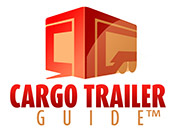Safe Cargo Trailer Towing Guidelines
Adhering to a routine checklist can prevent many problems and keep you and your cargo safe!
- Recheck the tie-downs to make sure the load will not shift during towing.
- Before towing, check coupling, safety chains, safety brake, tires, wheels, lights, and full retraction of the tongue jack.
- Check the lug nuts or bolts for correct tightness. Lug nuts on new wheels will continue to loosen until they seat properly. Make sure to check them when new at least every 50 miles.
- Check coupler tightness after towing for about 50 miles.
- Before pulling out onto the road, adjust the brake controller to engage the trailer brakes before the tow vehicle’s brakes are applied. Follow the brake controller manufacturer’s instructions. If the controller is set to high, too much trailer braking action can result in you losing control of your trailer. Too little braking action can cause you to not be able to stop properly.
- Make sure mirrors are adjusted properly for maximum visibility. Make sure you can see well enough to change lanes and pull into traffic.
- Turn on your turn signals well in advance of making turns or changing lanes.
- Do not whip the trailer fast when changing lanes. Lane changes should be smooth and gradual.
- Make sure to allow plenty of stopping distance for your cargo trailer and tow vehicle. Increase that amount for rainy conditions and wet roads.
- Do not drive so fast that the trailer sways. Proper cargo weight distribution will greatly reduce the possibility of your trailer swaying. Too much or too little cargo weight on the tongue can cause sway or other trailer control issues.
- Allow extra room for passing. One rule of thumb is to allow 4 times more passing distance for your trailer than you would without towing a trailer.
- Follow the tow vehicle manufacturer’s instructions for changing gears for automatic transmissions while pulling your trailer in the city.
- Use lower gears when climbing and descending grades.
- Do not ride the brakes, especially while descending grades. Doing so can cause the brakes to get very hot and stop functioning. This can result in a runaway trailer and tow vehicle.
- If you want to conserve fuel, do not use full throttle when climbing a hill. It is better to build speed upon approach of a hill.
- Slow down for bumps in the road. Remove your foot from the brake while crossing the bump.
- Do not brake while in a curve unless it is absolutely necessary. It is better to slow your speed before entering the curve.
- Do not apply the tow vehicle’s brakes to correct extreme swaying of your trailer. Instead, lightly apply the brakes with the trailer brake controller.
- Make regular stops about once every hour to confirm:
- Make sure the coupler is secure to the hitch and is locked.
- Electrical connection is still in place and all lights functioning.
- Plenty of slack for the safety chains.
- Tires are properly inflated and in good condition.
- The cargo is secure and not moving around.
- Carefully touch wheel bearing caps with your hand to make sure they are not overheating. If they get too hot, bearing failure can occur and a wheel could possible come off your trailer. Overheating is often a result of lack of bearing grease so it is best to have them checked prior to towing.
Be sure and read How to Couple and Uncouple Your Cargo Trailer
Contact your trailer dealer for more information on safely towing your cargo trailer.
